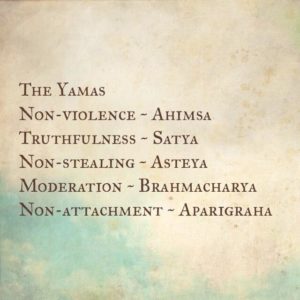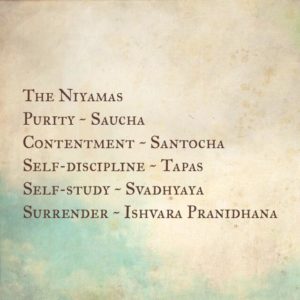Do you know this feeling of being all Zen and relaxed after your yoga class and just half an hour later, you’re feeling completely frustrated again? Just because your partner wasn’t supportive enough, you read a work email or your kids were, well, being kids?
Taking your yoga beyond the physical poses can be hard, because the literature about yoga’s traditions and yoga philosophy is old, stuffy, difficult to read and, especially in these days, we are all more distracted than ever.
But taking your yoga off the mat will bring you the peace of mind and clarity that you are looking for in order for you to keep that ‘Zen’ feeling for just a little bit longer and longer, and longer. No matter what happens around you.
Too many people in wealthy, developed societies have become so stressed that they can hardly breathe or enjoy life anymore. In many cases, this is what brings them to the yoga mat.
People are depressed, anxious, sleep deprived and overmedicated.
Though the physical postures can address these issues, many people find themselves wanting more. That’s why I’m so passionate to share more practical insights about the ancient yoga philosophy, as this can change your entire world.
I stick to very basic Sanskrit terminology to make it all accessible. Linking to texts like the Vedas, the Bhagavad Gita or the Mahabharata is way out of the scope of this blog post. Instead, the starting point will be Patanjali, who first wrote about ten principles in 200 BC in the Yoga Sutras.
Patanjali zoomed in on 10 principles that teach us how to balance our energy, for example, and how to change our thoughts. I have specifically modified the explanations of the principles to fit our modern-day world, so they will teach us how to stop worrying so we can apply going with the flow in an easy way.
The 10 principles are not the same as the 10 Commandments and they go beyond ethics and moral codes. Instead, our true nature already consists of these 10 qualities or principles—the five yamas, or things we can avoid doing in order to create a positive community, and the five niyamas, or things we can strive to achieve in order to create a positive relationship with ourselves.
Let’s zoom in !
The five yamas
Things we can avoid doing in order to create a positive community.
Not to bizarre that this comes first. Want to see a change in the world? Start with yourself. Someone already said that to us…

1. Non-violence
Ahimsa is the Sanskrit word for non-violence. All other principles have their origin in ahimsa. Non-violence equals universal love. It means complete abstention from causing any pain or harm whatsoever to any living creature, either by thought, word, or deed. It’s also easier said than done.
The way we approach non-violence goes beyond the ‘thou shalt not kill’ of the 10 Commandments. Our intention is different when we address non-violence in yoga philosophy. This is because, non-violence can mean many things.
There can be violence in the way you close a door for example, or in the way you pick a wild flower or simply enter a room. There’s violent energy when you are angry with your kids or when you wish for unpleasant things to happen to someone who cuts you off in traffic. As subtle as they may be, judgmental thoughts can truly be violen
Of course, some violence is much more obvious. Investigating how violence manifests in our daily lives and what we can practically do to cope with it and to bring in more ahimsa for the benefit of others and ourselves is what makes the yoga philosophy so very interesting. Read more on ahimsa…
2. Truthfulness
Satya is truthfulness, but it’s more than just telling the truth. The word ‘sat’ can be translated as ‘true essence’ or ‘unchangeable’.
In modern-day society, it seems to be extremely difficult to speak our truth. It’s as if we almost expect to be lied to and take it with a smile.
A whole different world opens up when we take the truthfulness towards ourselves. Are we aligned with what we say, do and think? This requires checking in with the words that we speak and finding the power of silence. Read more on satya…
3. Non-stealing
Asteya means non-stealing, and like the other yamas and niyamas, it means so much more that that. When zooming into the non-physical realm, which includes examples like stealing people’s enthusiasm in the name of “giving advice”, this principle can be a real wake up call, especially as we approach stealing away from any ethical norm or code.
Stealing brings us also to the topics of ownership and abundance, and particularly so when we look at the things that we label as ‘ours’, from ‘our’ kids to ‘our’ wife and husband. And the concept of abundance is one that we can explore and cherish only when we understand what it encompasses. Read more on asteya…
4. Moderation
Brahmacharya is often translated as celibacy – but it can also be translated as ‘behaviour which leads to Brahman’. Brahman is thought of as ‘the creator’ in Hinduism and yogic terms. So Energy is the central topic of this principle. Moderation, or non-excess, teaches us humbleness, realizing that not all resources are endless.
Most people are overindulging in practically everything, except resting.
5. Non-attachment
Aparigraha, also translated as non-greed, non-possessiveness.
On a physical level, it can be so liberating to be free from greed and not wanting more stuff. And on a mental level, you can be freed from old beliefs, patterns, habits and incorporate the idea of ‘letting go’ into their lives.
It can be about not hoarding, control and expectations.
The five niyamas
The things we can strive to achieve in order to create a positive relationship with ourselves.

6. Purity
Saucha as a tool and guideline to feel lighter and to create space for new adventures.
Being clean and everything that comes with it is not the same as being pure.
Impurities in both our external environment and our internal body adversely affect our state of mind.
It’s all about consciously and continuously working on our surroundings and environments, the food we take in, the friends we hang out with, the air we breathe, the house we live in and so on.
7. Contentment
Santocha or the state of happiness and satisfaction wherein we accept life as it is. When we see the main purpose of life as joy, this joy can lead to contentment easily. But, how do we get to joy?
By not craving for what we do not have as well as not wanting the possessions of others, is a good start. Practicing contentment and gratitude frees us from the unnecessary suffering of always wanting things to be different, and instead fills us with more joy.
8. Self-discipline
Tapas or self-discipline: some people have a bit too much; some people can use a bit more. Self-discipline is one of the keys to living a light and joyful life. When we practice tapas, we can create new patterns for our body, mind and speech.
It’s the cultivation of self-discipline that allows us to be present in the here and now with whatever is occurring, whether it be positive, negative or neutral.
If you see willpower as a battery, it makes total sense that we sometimes run out of power.
9. Self-study
Svadhyaya or investigating and learning about ourselves.
Who am I? Why do I do the things that I do? Am I on time or usually late? Am I rather happy or rather unhappy? and Where do I go when things get difficult?
Life presents an endless opportunity to learn about ourselves; our flaws and weaknesses give us the opportunity to grow and our mistakes allow us to learn.
Examining our actions becomes a mirror to see our conscious and unconscious motives, thoughts, and desires more clearly.
10. Surrender
Ishvara Pranidhana or the dedication, devotion, and surrender of the fruits of one’s practice to a higher power. It can be so liberating to accept life as it. And it can be so easy to reach with the right mindset and tools.
It’s all about the phrase of ‘It is what it is,’ and sometimes, brilliantly failing in actually applying the words to your own situation. It’as also realizing that we are all connected and have a direct link with the divine.
These blogs on the yoga philosophy give you a sneak peak in the book that I am writing about the yoga philosophy. Explanations of the principles themselves are supported by clear examples from my early life in the corporate world and stories from my current profession as a life coach, yoga teacher and retreat leader.
Namaste,
Rachel
Rachel Bonkink
I have been a life coach for over ten years now and I’m seriously passionate about lifting people to their higher potential. Over the years, the base of my life coachings relies more and more on the yoga philosophy. I organize and host the most amazing yoga retreats and yoga holidays around the world.









Leave a comment